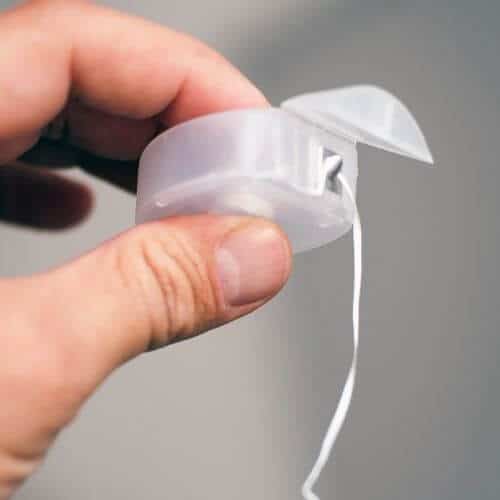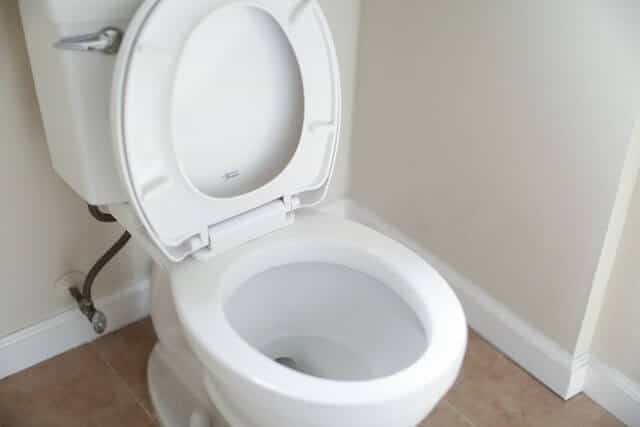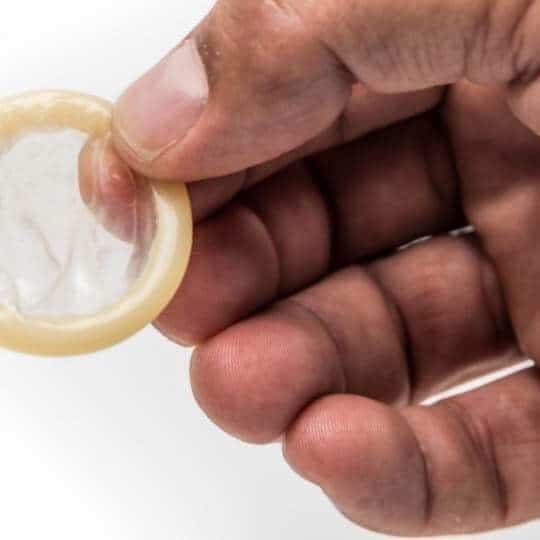Did you know that the only things you can safely flush down the toilet are human waste and toilet paper? For easier recollection, keep in mind the 4 Ps: pee, poop, puke, and (toilet) paper. Most of us hear this valuable piece of advice at least once, from a plumber or from a product’s instructions. Even so, people may still wonder: “Can you flush dental floss?”
When you are not aware of how toilet drains work, you may be tempted to flush all kinds of waste.
Especially when it’s a small item, such as dental floss, you may think that it can’t hurt.
In fact, one of the reasons why we are here offering plumbing tips is people flushing all kinds of things. Any item besides human waste and toilet paper going in a toilet drain can cause trouble.
Can you flush dental floss?

Dental floss is a product most of us use every day. Some people use it just at night, other use it after every meal. It’s a ubiquitous item that is found in the bathrooms of millions of Americans. Some of that dental floss reaches the toilet drain, that’s for sure!
Short answer, you must not flush dental floss.
You want to find out why and what can happen if you break the rule? Keep on reading.
What is dental floss made of?

Dental floss is a very old invention. In ancient times, people used horse hair to clean the spaces between their teeth. In the 19th century, our ancestors used silk threads to complete their oral hygiene.[1]
Dental floss has been around for so long due to its benefits. It enables us to clean areas that are not reachable with a toothbrush, thus preventing interdental caries. Most times, this type of tooth decay becomes visible too late, when the tooth is already severely affected.
However, dental floss has become mainstream only in the 1940s, when nylon floss was invented. This type of floss has remained very popular up to these days.
Most dental floss products are synthetic and made from nylon. Floss consists of multiple nylon filaments twisted together in order to create a strong strand.
Other products are made from Teflon, the same fiber used for cookware. Unlike nylon, Teflon floss needs just one filament to do its job without shredding.
These two types of dental floss are not biodegradable. This is why lately natural floss has seen a new rise in popularity. Made from biodegradable silk, eco-friendly floss is usually coated with wax (beeswax or plant derived).
There is an alternative to dental floss, and that is the oral irrigator. This device uses a stream of high-pressure pulsating water to remove food waste and plaque. What’s great, it can also clean the area below the gum line.
But if you use dental floss, even occasionally, you are probably wondering: can you flush dental floss?
Let’s suppose you do – now we will see what can happen as a result.
What can happen if you flush dental floss?
Most dental flosses are made from nylon or Teflon, synthetic materials which do not break over time.
This means they can get stuck inside your drain, causing serious plumbing issues. Floss represents a huge problem, in spite of its small size.
Even if you throw just short threads of floss, those pieces can combine with other items that are already there. A baby wipe caught in a pipe dent can attract floss, grease, and other waste and form a clog.
But let’s take the other scenario, where floss doesn’t stop in your drain. You may sigh relieved that the floss is now in the municipal sewage system, but not just yet.
Wastewater treatment plants are not designed to remove non-biodegradable items from water. When these plants deal with balls of debris and human waste (how disgusting!) they can malfunction. The very expensive repairs are covered by taxpayers’ money, including yours.
What does this mean?
If you flush stuff you should not, you will pay for the damage you create some way or another. At the same time, clogs in sewers can cause sewage spills and affect water quality. Sewage spills affect public health and your own health.
So, a lot of bad things can happen if you flush dental floss. And it’s not just a remote possibility – it’s a certainty!
How to unclog toilet clogged by dental floss

Let’s say the unthinkable happened, even if you were warned not to flush dental floss. It can happen accidentally; we totally understand that.
In such situations, best is to put some elbow-length gloves and reach for the floss before it leaves the drain.
Are you already suspecting a clog? This means you have flushed all kinds of prohibited items, multiple times. The good news is now you know how to use your toilet correctly. As for the clog, there are two simple methods you can try to release it from your toilet drain:
- Use a plunger
Before considering a plunger to unclog your toilet, make sure you are using a flange plunger. This type of plunger is the best option for toilets and has an additional ring of rubber around the cup.
Introduce the flange into the toilet drain and seal in the air. This will give you suction power. Use firm pressure to push and pull the plunger vertically. Plunge the drain for about 20 seconds. Repeat for longer and with extra force if the drain is still slow.
- Use a plumbing snake
Aside from the snake, be prepared with rubber gloves, rags, a bucket, and drain cleaners.
Push the head of the snake into the toilet drain, feeding 8 to 12 inches into the pipe at the time. When the entire snake is inside the drain, start spinning the handle clockwise. Keep rotating at a steady pace.
When you hit a blockage, wiggle and rotate the head of the snake. Push the toilet auger through the blockage to break it. If you hear scraping noises, stop – this means you may be damaging the pipe.
Take out the drain snake and clean it when the blockage is removed.
Is it illegal to flush dental floss?
Most likely, no one will come to ask you about flushing floss or other items. Whether it is legal or not to flush stuff down the toilet depends on the area where you live. There may be rules against it if you live in a rented flat.
When it comes to flushing unsuitable items, authorities seem to focus on education and prevention rather than applying sanctions. For instance, initiatives such as “Trash it, don’t flush it” from NYC Environmental Protection explains people how fatbergs are formed.[2] They inform citizens on the impact that fatbergs and other types of clogs have on sewage systems.
How do you dispose of dental floss?
Quick research on what you can flush and what you cannot reveals one thing: you must not flush dental floss.
If you use synthetic dental floss, its place is in the trash bin. If your floss is made from natural fibers, you can compost it.
There is always the alternative of an oral irrigator, as mentioned earlier. This solution eliminates floss waste from landfills and can be even more effective in terms of hygiene.
How long does it take for dental floss to decompose?
Up to this date, there is no safe way to dispose of dental floss because it is not biodegradable. Dental floss gathers up in landfills and takes at least 200 years to decompose, depending on what it’s made of. Moreover, it cannot be recycled either for safety reasons (it is contaminated with bacteria after use). And the fact that different materials go into floss also makes it difficult and impractical to recycle.
In spite of dental floss’s popularity as a dental hygiene tool, there are many problems related to it. And floss clogging sewers seems to be just one of them.
What other things should you not floss down the toilet?

Floss rarely is the only culprit in case of a clogged toilet. A homeowner dealing with a clogged toilet has probably flushed other unsuitable items as well, such as:
- Hair
- Feminine products
- Condoms
- Baby wipes
- Diapers
- Cat litter
- Q-tips
- Pills
- Food
- Liquid drain cleaner
- Grease
- Matches
- Cigarette stubs
Just like dental floss, all these items belong to the waste bin or to the compost bin if biodegradable.
Can you flush dental floss? – Final Word
You can do it, but with negative consequences. You can clog your toilet, you can damage the municipal sewer, and you can harm the environment.
Under no circumstances should you flush dental floss. Even if you flush just small amounts of it, those tiny pieces will add up and eventually create a clog. If the clog is in your home, you pay to have it removed. If the problems develop in the city sewer, you still pay, but indirectly.

Michael Davis is a heating & plumbing expert who currently works as independent contractor in SC. He also writes for Plumbertip.
For almost 10 years he worked on various plumbing tasks across South Carolina.



